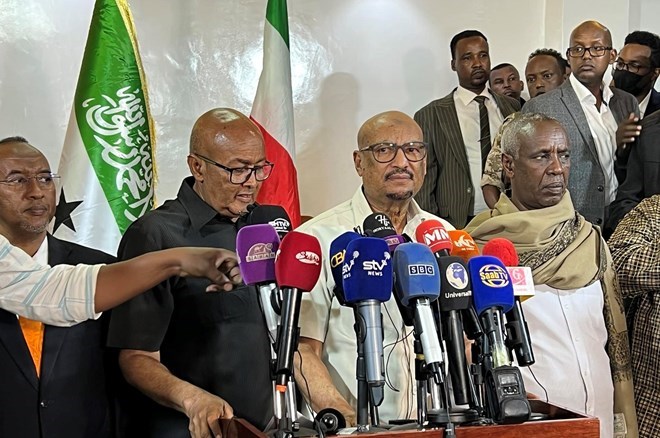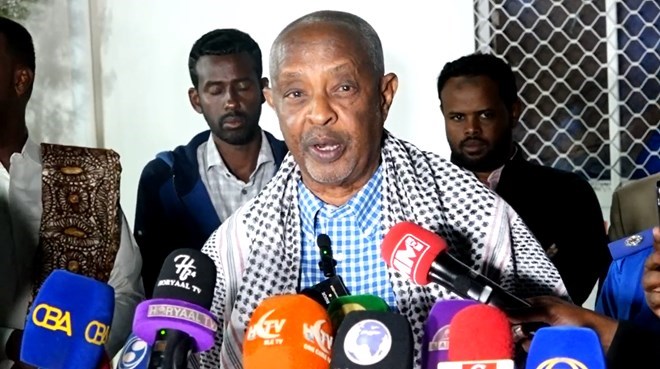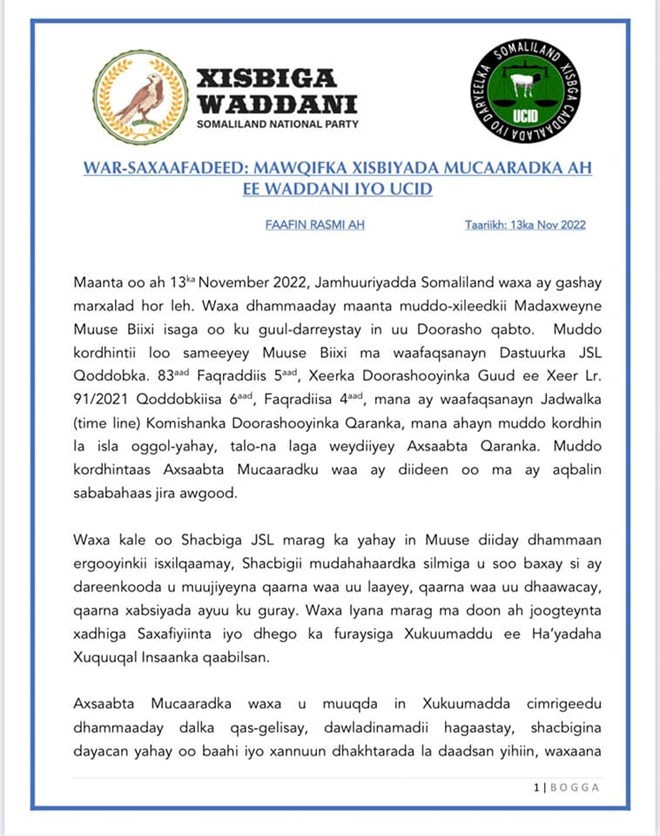
Sunday November 13, 2022
Waddani Party leader Abdirahman Mohamed Abdullahi (L) and UCID Party Leader Faysal Ali Warabe (R) during a press conference on Sunday. The two opposition leaders announced they would no longer recognize the legitimacy of the Somaliland government after its constitutional mandate expired on November 13, 2022. SUPPLIED
The leaders of Waddani and UCID released a 4-point communique urging investors and the international community not to engage with the Somaliland government, which it describes as "illegitimate."
advertisements
"Starting from today, Musa Bihi and his cabinet of ministers do not have the legitimacy to continue running the country in accordance with Article 88(1) of the Constitution. Continuance of his administration is tantamount to rule by force and autocracy," the joint statement reads in part."We call on the international community and foreign companies to neither enter any agreement with the outgoing president whose term in office expired, cooperate with him in any form nor support him or his cabinet of ministers in any way."
It goes on to say that the opposition parties only recognize Musa Bihi as the 'Chairman of Kulmiye Party' and refer to him as the 'President whose term expired.'
The statement does affirm that it still recognizes the legitimacy of the House of Representatives, the courts and local councils.
Following a breakdown in negotiations with the Somaliland government last month, opposition leaders warned they would cease recognizing the government's authority after the constitutional mandate expiry.
Somaliland's Internal Affairs Minister Mohamed Kahin Ahmed dismissed the joint statement and its authors as opportunists."Unfortunately, several Somaliland citizens who aspire to be president and have already run for office contend today that Somaliland does not have a (legal) government. A country that does not have a president does not have a government. It is a country without law and order." said Kahin
Kahin argued that the extension had legal precedence and that the constitution allows the House of Elders to extend the government's mandate if necessary.
He pointed out that Abdirahman Mohamed Abdullahi Irro - the leader of the UCID party and candidate for president - was elected to serve as the Speaker of the House of Representatives for a five-year term in 2005 but served in the position until 2017.

Somaliland's Internal Affairs Minister Mohamed Kahin Ahmed
Somaliland Police Commander Brigadier General Mohamed Adan Saqadhi Dabagale, who also addressed reporters, stated that Somaliland's security is stable and promised to defend the people.
The breakaway region was scheduled to have presidential elections on Nov 13, but Bihi obtained a two-year extension from the House of Elders, a move fiercely rejected by opposition parties.
The Electoral Commission announced in September that it would need at least nine months to organize the presidential election, citing "technical and budgetary" reasons for the delay.
The rejection of the presidential mandate extension fuels concerns about renewed regional tensions and political violence.
Last April, Somalia's then-President Mohamed Abdullahi Farmajo signed a controversial measure extending his term in office by two years which was met with fierce criticism and armed opposition. After forces loyal to the opposition - which included some military and police - seized some key points in the capital, President Farmajo was forced to walk back his term extension and return to a timetable for indirect elections.
The Somaliland political crisis already descended into violence when at least five people were killed and 100 injured in mid-August after security forces clashed with protesters demanding presidential elections be held in November.
Somaliland's constitution only allows for three political parties to contest in national elections. The results of municipal elections held at the beginning of every decade determine which parties end up on the coveted ballot.
A municipal election was supposed to place in December to determine which parties could participate in the national poll.
Somaliland's current government wants the presidential elections to occur after the municipal elections. The current national opposition party leaders see this move as a way to remove them from the ballot.
